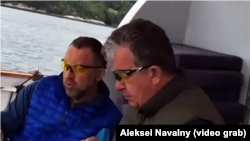Alexey Navalny’s video investigating ties between Russian billionaire Oleg Deripaska and Russian Deputy Prime Minister Sergei Prikhodko, which was published on the website of Navalny’s Anti-Corruption Foundation and posted on YouTube, was viewed nearly five million times in just one week.
The video is also the target of two lawsuits -- one filed by Deripaska, the other by Navalny. As the immediate result of Deripaska's lawsuit, Roskomnadzor, Russia’s communications regulator, added the postings of the video to its list of banned Web pages.
Deripaska is reportedly a confidant of President Vladimir Putin, and also has ties to President Donald Trump’s former campaign manager, Paul Manafort.
Prikhodko, widely seen as Putin’s most influential shadow foreign policy adviser, is also the chairman of Korporatsiya Takticheskoe Raketnoe Vooruzhenie – a private firm that has the largest contracts with the Russian military to develop tactical missiles and missile systems.
Navalny, Russia’s most popular opposition figure, has been barred from taking part in the country’s upcoming presidential elections.
Navalny’s video, which was posted on February 8, shows Deripaska and Prikhodko relaxing on the oligarch’s private yacht off the coast of Norway in August 2016. With the two men is a woman described as a “VIP escort.” At one point in the video clip, the two men discuss Russia-U.S. relations, and seem to blame Victoria Nuland, former U.S. Assistant Secretary of State Victoria Nuland, for the deterioration of those ties.
Navalny said he found the video footage on the Instagram account and YouTube channel of the young “VIP escort,” Anastasia Vashukevich, who goes by the name Nastya Rybka. He also quoted from her book “A Journal: How to Seduce a Billionaire” – in which, according to Navalny, Rybka refers to Deripaska as “Ruslan” and Prikhodko as “Papa.”
Sergei Prikhodko has not denied the authenticity of the video/photo/audio materials or any of Rybka’s claims regarding his appearance and behavior on Deripaska’s yacht. In a written statement to Russia’s RBC news outlet published on February 9, Prikhodko only spoke about Alexey Navalny, describing him as “a political loser” who “once again tried to stage a provocation and call attention to himself.”
Prikhodko added that Navlany “confusingly mixed everything possible and impossible – from my friend (Oleg Deripaska) to the American President Trump and Manafort, who I do not know personally.”
On February 10, Deripaska’s lawyers filed a lawsuit against Anastasia Vashukevich (Nastya Rybka), demanding that she remove 14 Instagram posts and seven videos that violate Deripaska’s right to privacy under article 24 of the Russian Constitution.
Deripaska’s legal representatives stated that Navalny “is not a defendant in the suit.” However, several developments before and after the suit was filed suggest that while Navalny formally is not a defendant in Deripaska’s lawsuit, he might very well be the target of it.
First of all, while Prikhodko told RBC that he himself would not be pursuing Navalny legally, because “it is enough that others are doing that,” Deripaska filed the lawsuit the next day.
Second, after Deripaska’s legal team filed suit, Roskomnadzor immediately added Navalny’s video investigation to its official list of sites containing information not to be distributed in Russia, specifically referring to Deripaska's lawsuit as the reason.
The Interfax news agency reported on February 15 that on the basis of a court ruling, Roskomnadzor was taking measures to restrict access to Web sites that had posted personal information about persons mentioned in Navalny’s video investigation.
"Roskomnadzor received a ruling of Ust-Labinsk district court [in southern Russia’s Krasnodar region] on interim measures on the claim,” Interfax quoted an unnamed source in Roskomnadzor’s press service as saying. “The court decision obligates Roskomnadzor to take measures to restrict access to information posted on a number of Internet resources."
Roskomnadzor announced around midday on February 14 that "nearly 30 resources" had deleted Navalny's video from their sites.
On February 15, Alexey Navalny said Roskomnadzor had blocked access to his website in Russia. At the time of this publication, https://navalny.com could not be accessed on Polygraph.info's computers in Washington, DC.
Third, the photographs and videos in question had been publicly available on Rybka’s Instagram account and her YouTube channel at least for two years, but Deripaska never before complained that they violated his privacy. It is possible he did not know they existed, but Rybka claims the two kept in touch after the yacht incident.
Navalny’s producer Oxana Baulina said they have received a warning from YouTube and Google Russia offices ordering them to remove Navalny’s video-investigation.
Navalny has filed an appeal with Moscow’s Taganka district court against Roskomnadzor. demanding that it remove his investigation from the list of the banned materials.
Finally, Deripaska’s legal team has cited Article 24 of the Russian Constitution, which states: “Collecting, storing, using and distribution of information about the private life of individual without their consent is prohibited.”
There is, however, an exception – if the individual in question is a government official and the information is vital to the public interest. The “government” exception would apply to Prikhodko. It is up to interpretation whether the “public interest” exception would include Deripaska, who is known to be close to Putin and whose companies do business with the Russian Federation.
One particularly notorious use of this exception occurred in March 1999, when state-controlled Russian television aired a video showing, in its words, “a man resembling” then Prosecutor General Yury Skuratov, in bed with two prostitutes. Skuratov had been investigating charges of corruption against then President Boris Yeltsin.
Skuratov resigned after the then director of Russia’s Federal Security Service (FSB), Vladimir Putin, confirmed that Skuratov was indeed the man featured in the video.
It is widely assumed that Russia’s intelligence services secretly arranged the filming of Skuratov in bed with the prostitutes in order to use the footage as “kompromat” – compromising material – against him.





